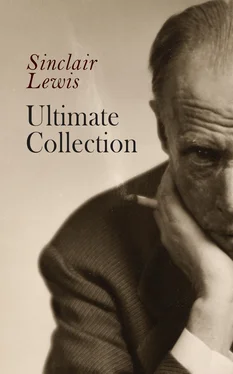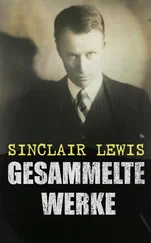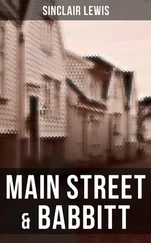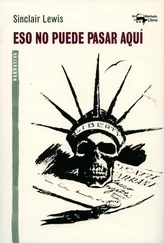Carol gazed with a polite approximation to interest at Mr. Dashaway, a tan person with a wide mouth. “Oh, I know! He's the furniture-store man!” She was much pleased with herself.
“Yump, and he's the undertaker. You'll like him. Come shake hands with him.”
“Oh no, no! He doesn't — he doesn't do the embalming and all that — himself? I couldn't shake hands with an undertaker!”
“Why not? You'd be proud to shake hands with a great surgeon, just after he'd been carving up people's bellies.”
She sought to regain her afternoon's calm of maturity. “Yes. You're right. I want — oh, my dear, do you know how much I want to like the people you like? I want to see people as they are.”
“Well, don't forget to see people as other folks see them as they are! They have the stuff. Did you know that Percy Bresnahan came from here? Born and brought up here!”
“Bresnahan?”
“Yes — you know — president of the Velvet Motor Company of Boston, Mass. — make the Velvet Twelve — biggest automobile factory in New England.”
“I think I've heard of him.”
“Sure you have. Why, he's a millionaire several times over! Well, Perce comes back here for the black-bass fishing almost every summer, and he says if he could get away from business, he'd rather live here than in Boston or New York or any of those places. HE doesn't mind Chet's undertaking.”
“Please! I'll — I'll like everybody! I'll be the community sunbeam!”
He led her to the Dawsons.
Luke Dawson, lender of money on mortgages, owner of Northern cut-over land, was a hesitant man in unpressed soft gray clothes, with bulging eyes in a milky face. His wife had bleached cheeks, bleached hair, bleached voice, and a bleached manner. She wore her expensive green frock, with its passementeried bosom, bead tassels, and gaps between the buttons down the back, as though she had bought it second-hand and was afraid of meeting the former owner. They were shy. It was “Professor” George Edwin Mott, superintendent of schools, a Chinese mandarin turned brown, who held Carol's hand and made her welcome.
When the Dawsons and Mr. Mott had stated that they were “pleased to meet her,” there seemed to be nothing else to say, but the conversation went on automatically.
“Do you like Gopher Prairie?” whimpered Mrs. Dawson.
“Oh, I'm sure I'm going to be ever so happy.”
“There's so many nice people.” Mrs. Dawson looked to Mr. Mott for social and intellectual aid. He lectured:
“There's a fine class of people. I don't like some of these retired farmers who come here to spend their last days — especially the Germans. They hate to pay school-taxes. They hate to spend a cent. But the rest are a fine class of people. Did you know that Percy Bresnahan came from here? Used to go to school right at the old building!”
“I heard he did.”
“Yes. He's a prince. He and I went fishing together, last time he was here.”
The Dawsons and Mr. Mott teetered upon weary feet, and smiled at Carol with crystallized expressions. She went on:
“Tell me, Mr. Mott: Have you ever tried any experiments with any of the new educational systems? The modern kindergarten methods or the Gary system?”
“Oh. Those. Most of these would-be reformers are simply notoriety-seekers. I believe in manual training, but Latin and mathematics always will be the backbone of sound Americanism, no matter what these faddists advocate — heaven knows what they do want — knitting, I suppose, and classes in wiggling the ears!”
The Dawsons smiled their appreciation of listening to a savant. Carol waited till Kennicott should rescue her. The rest of the party waited for the miracle of being amused.
Harry and Juanita Haydock, Rita Simons and Dr. Terry Gould — the young smart set of Gopher Prairie. She was led to them. Juanita Haydock flung at her in a high, cackling, friendly voice:
“Well, this is SO nice to have you here. We'll have some good parties — dances and everything. You'll have to join the Jolly Seventeen. We play bridge and we have a supper once a month. You play, of course?”
“N-no, I don't.”
“Really? In St. Paul?”
“I've always been such a book-worm.”
“We'll have to teach you. Bridge is half the fun of life.” Juanita had become patronizing, and she glanced disrespectfully at Carol's golden sash, which she had previously admired.
Harry Haydock said politely, “How do you think you're going to like the old burg?”
“I'm sure I shall like it tremendously.”
“Best people on earth here. Great hustlers, too. Course I've had lots of chances to go live in Minneapolis, but we like it here. Real he-town. Did you know that Percy Bresnahan came from here?”
Carol perceived that she had been weakened in the biological struggle by disclosing her lack of bridge. Roused to nervous desire to regain her position she turned on Dr. Terry Gould, the young and pool-playing competitor of her husband. Her eyes coquetted with him while she gushed:
“I'll learn bridge. But what I really love most is the outdoors. Can't we all get up a boating party, and fish, or whatever you do, and have a picnic supper afterwards?”
“Now you're talking!” Dr. Gould affirmed. He looked rather too obviously at the cream-smooth slope of her shoulder. “Like fishing? Fishing is my middle name. I'll teach you bridge. Like cards at all?”
“I used to be rather good at bezique.”
She knew that bezique was a game of cards — or a game of something else. Roulette, possibly. But her lie was a triumph. Juanita's handsome, high-colored, horsey face showed doubt. Harry stroked his nose and said humbly, “Bezique? Used to be great gambling game, wasn't it?”
While others drifted to her group, Carol snatched up the conversation. She laughed and was frivolous and rather brittle. She could not distinguish their eyes. They were a blurry theater-audience before which she self-consciously enacted the comedy of being the Clever Little Bride of Doc Kennicott:
“These-here celebrated Open Spaces, that's what I'm going out for. I'll never read anything but the sporting-page again. Will converted me on our Colorado trip. There were so many mousey tourists who were afraid to get out of the motor 'bus that I decided to be Annie Oakley, the Wild Western Wampire, and I bought oh! a vociferous skirt which revealed my perfectly nice ankles to the Presbyterian glare of all the Ioway schoolma'ams, and I leaped from peak to peak like the nimble chamoys, and —— You may think that Herr Doctor Kennicott is a Nimrod, but you ought to have seen me daring him to strip to his B. V. D.'s and go swimming in an icy mountain brook.”
She knew that they were thinking of becoming shocked, but Juanita Haydock was admiring, at least. She swaggered on:
“I'm sure I'm going to ruin Will as a respectable practitioner —— Is he a good doctor, Dr. Gould?”
Kennicott's rival gasped at this insult to professional ethics, and he took an appreciable second before he recovered his social manner. “I'll tell you, Mrs. Kennicott.” He smiled at Kennicott, to imply that whatever he might say in the stress of being witty was not to count against him in the commercio-medical warfare. “There's some people in town that say the doc is a fair to middlin' diagnostician and prescription-writer, but let me whisper this to you — but for heaven's sake don't tell him I said so — don't you ever go to him for anything more serious than a pendectomy of the left ear or a strabismus of the cardiograph.”
No one save Kennicott knew exactly what this meant, but they laughed, and Sam Clark's party assumed a glittering lemon-yellow color of brocade panels and champagne and tulle and crystal chandeliers and sporting duchesses. Carol saw that George Edwin Mott and the blanched Mr. and Mrs. Dawson were not yet hypnotized. They looked as though they wondered whether they ought to look as though they disapproved. She concentrated on them:
Читать дальше












